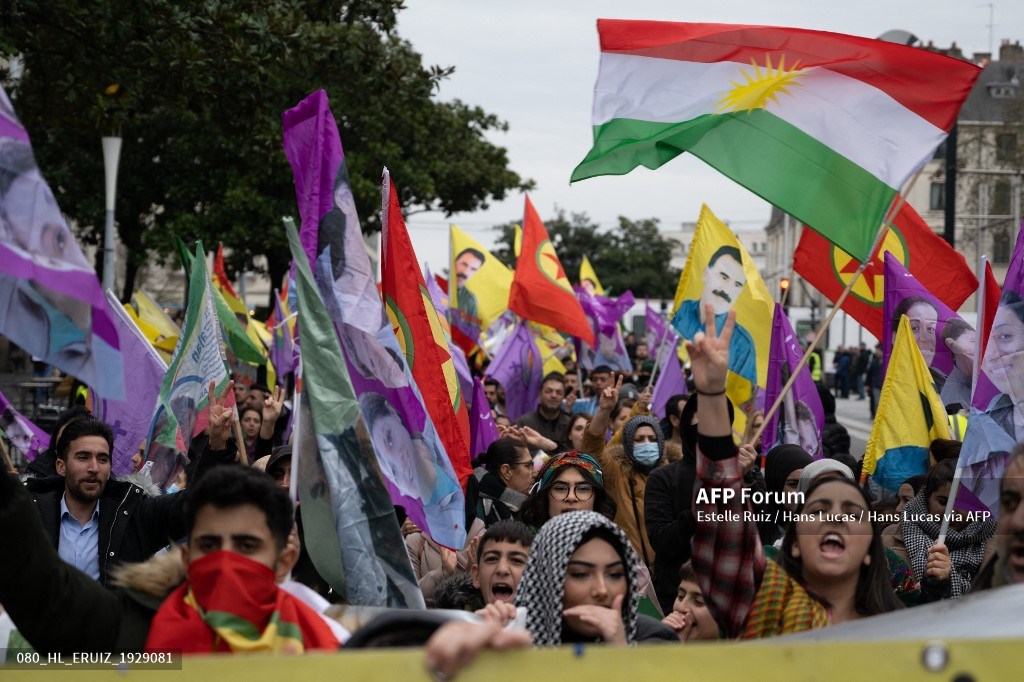Thousands of Kurds from across Europe traveled to the Paris suburbs Tuesday for the politically charged funeral of three of their own killed in a December attack in the French capital, Agence France-Presse reported.
Buses were chartered to bring people from across France and some neighboring countries to the ceremony in Villiers-le-Bel, north of Paris, local sources said.
Tears and cries of “Martyrs live forever!” greeted the coffins, wrapped in the flags of the Kurdistan Workers’ Party (PKK) and the Kurdish-controlled Rojava territory in northern Syria.
The huge crowd followed the funeral on giant screens erected in the car park, showing the coffins surrounded by wreaths beneath a portrait of imprisoned PKK leader Abdullah Öcalan.
Police and security volunteers were on duty outside the hall hired for Tuesday’s proceedings.
A xenophobic gunman, William Malet, killed two men and one woman in a December 23 attack on the Ahmet Kaya community center in Paris’s 10th district.
His victims were Abdurrahman Kızıl, singer and political refugee Mir Perwer and Emine Kara, a leader of the Movement of Kurdish Women in France.
Arrested after the shootings and formally charged on December 26, the 69-year-old Malet told investigators he had a “pathological” hatred for foreigners and wanted to “murder migrants,” prosecutors said.
Distrust of Turkey
Malet, a retired train engineer, has a violent criminal history and had just left detention over a previous incident.
But many Kurds in France’s 150,000-strong community refuse to believe he acted alone, calling his actions a “terrorist” attack and pointing the finger at Turkey.
Tuesday’s funeral recalled another held at the same spot almost exactly 10 years ago after three Kurdish activists linked to the PKK were shot dead, also in Paris’ 10th district.
The Turkish suspect in the killings, believed to have had ties to Ankara’s secret services, died of cancer in pre-trial detention.
More recently, an April attack in which men were beaten with iron bars at a Kurdish cultural center in the eastern French city of Lyon was blamed on members of the Turkish ultra-nationalist Grey Wolves, which has since been banned.
The PKK, which has waged an almost four-decade armed struggle for greater rights for Turkey’s Kurdish minority, is categorized as a terrorist group by Turkey and much of the international community.
Its leader Öcalan is serving a life sentence on a prison island off Istanbul after being captured by Turkish agents in Kenya in 1999.
‘Battle must continue’
Often described as the world’s largest people without a state, Kurds originate in regions spread across Turkey, Syria, Iraq and Iran, with Ankara especially hostile to their striving for a country of their own.
“We feel like they’re doing everything they can to crush us, whether it’s here or in Turkey,” said Çelik, a local who attended the funeral and asked that her family name not be published for security reasons.
“We’re here because it’s our duty, it’s a battle our parents fought for many years and that we must continue,” she told AFP.
Clashes between police and Kurdish demonstrators in the immediate aftermath of the December killings ratcheted up tensions between nominal NATO allies Turkey and France.
Ankara’s foreign ministry summoned the French ambassador to complain of “black propaganda launched by [the] PKK.”
The Democratic Council of Kurds in France (CDKF) called Tuesday’s ceremony an “opportunity for those who wish to pay their final respects … before the bodies are repatriated to their native soil” for burial.
CDKF activists plan a march Wednesday in tribute to the December victims, on the street where the shootings took place.
On Saturday, a “grand march” of the Kurdish community — originally planned to mark the 10th anniversary of the 2013 shootings — will set off from Paris’ Gare du Nord rail hub.
